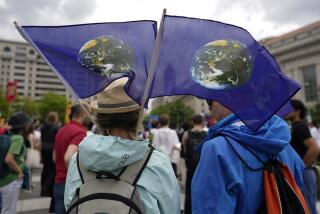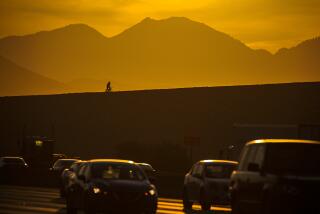April 3 was not the first...
- Share via
April 3 was not the first Easter on which Protestants and Catholics had to turn their clocks ahead one hour or risk being late for services. The Washington-based Daylight Saving Time Coalition, reminding news media of the 1987 change to the first Sunday in April, had said recently this was an Easter “first” for non-Orthodox churchgoers.
But Dr. Arthur H. Hurd of San Juan Capistrano remembered differently, and news clippings confirm that he was right.
Daylight saving time was first introduced by Congress in 1918 as a wartime conservation measure.
“Training of troops will be expedited,” said the Los Angeles Sunday Times of March 31, 1918. The extra hour of sunlight at the end of the day was expected to benefit “men working in war plants” and to encourage an extra hour of home gardening time, thought to be a safeguard against a possible food shortage.
The Sunday it was instituted happened to be Easter. The Times of Saturday, March 30, 1918, said the churches would “generally be the first public bodies to make use of the new time schedule” the next morning for rites of “the great Christian festival,” including the “undenominational services on various hilltops and mountain peaks at sunrise.”
As a small boy in Riverside, Hurd wrote, “I well remember arising after only a few hours sleep to board the Big Red Car which took us as close as possible to the foot of the Mt. Rubidoux, from whence we traveled on the trail.
“I also recall as a part of the sunrise service a magnificent rendition by Frederick Warde, the actor, of Henry van Dyke’s ‘God of the Open Air,’ ” Hurd said.
HOLIDAY
The Islamic Center of Southern California in Los Angeles says it will start its observance of the fast of Ramadan, one of the five pillars of the Islamic faith, on Sunday. For the 28-day lunar month, Muslims are expected to neither eat nor drink during daytime hours. The period also is one of large family meals at night, reading of the Koran and spending time at the mosque.
DATES
Pepperdine University’s 45th annual Bible Lectureship Tuesday through Friday deals mostly with themes from the Gospel of Matthew in seven lectures and 144 classes. But the Churches of Christ-related conference also features “A Christian Response to the ‘New Age’ Movement” by Prof. L. LaGard Smith of Pepperdine’s School of Law on Wednesday, Thursday and Friday evenings. A new film will be shown Tuesday night on Alexander Campbell, a founder of the 19th-Century U.S. movement from which sprang the Churches of Christ, the Christian Churches and Churches of Christ, and the Christian Church (Disciples of Christ). In an independent conference Monday and Tuesday at the School of Theology at Claremont, the bicentennial of Campbell’s birth will be observed by speakers representing all three branches of the movement.
Vajra Regent Osel Tendzin, an American empowered 12 years ago as heir to a Tibetan Buddhist leader who died last year, was to begin a 10-day Los Angeles visit Friday. Tendzin, who succeeded the Venerable Chogyam Trungpa Rinpoche and now lives in Halifax, Nova Scotia, will lecture at 8 p.m. today on “the direct path to enlightenment” at Wilshire Ebell Theater. Tendzin also will formally bless the new Los Angeles Dharmadhatu center at 8218 W. 3rd St. in West Hollywood Monday night with many Los Angeles Buddhist leaders in attendance.
DEBATE
“Is God Finite?” is the topic for a public debate Wednesday in Claremont by two scholars prominent in their respective wings of Protestantism. John B. Cobb Jr., a leading proponent of process theology, which does not espouse God as all-powerful in the popular sense, will be faced by Norman L. Geisler, a theology professor at fundamentalist Dallas Theological Seminary who has testified in a number of creation-evolution court cases.
Cobb has the home court advantage: The debate (7:30 p.m., $3 donation) will be at in Mudd Auditorium at the School of Theology at Claremont, where Cobb teaches. But Geisler is expected to carry the ball for the sponsoring Simon Greenleaf Debate Society of La Habra, which organizes opportunities to debate “Christianity’s most significant opponents” (such as atheists and secular humanists) and to contend with viewpoints within the Church “which may or may not be true to the Scriptures.”
More to Read
Sign up for Essential California
The most important California stories and recommendations in your inbox every morning.
You may occasionally receive promotional content from the Los Angeles Times.













